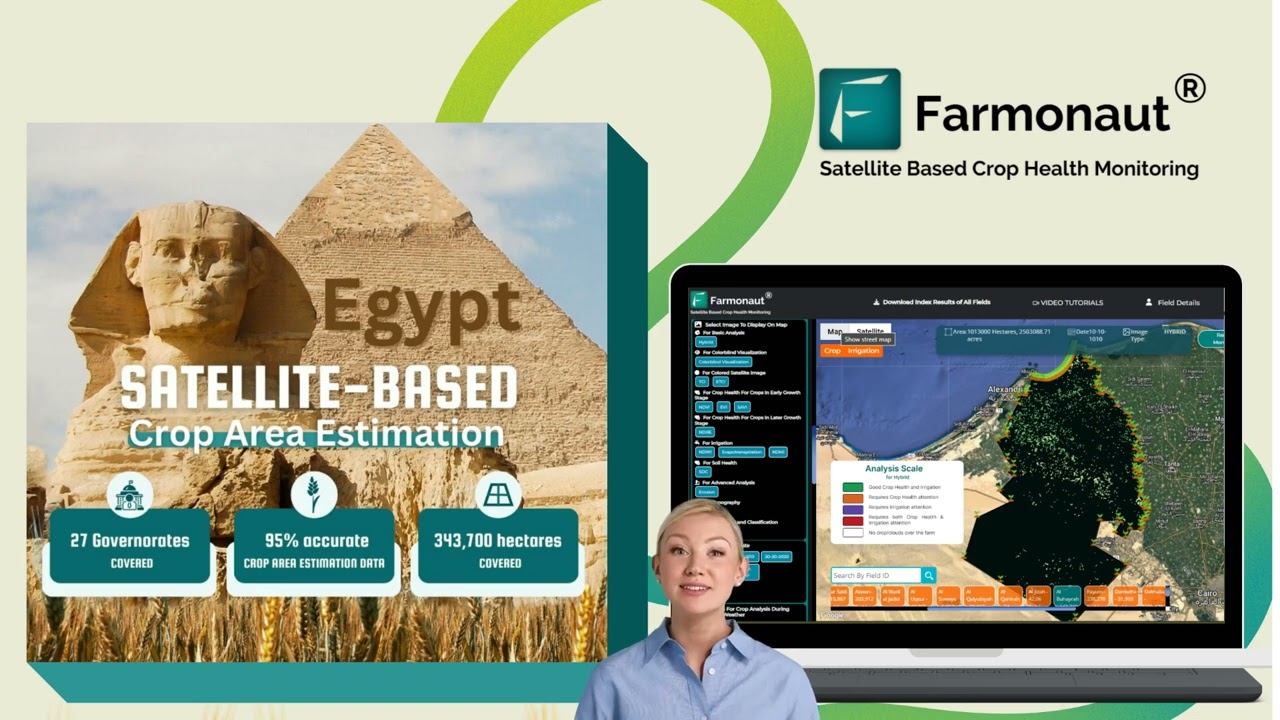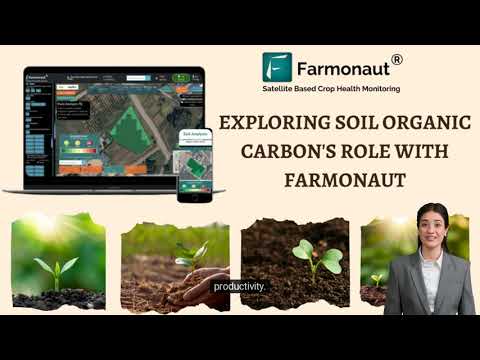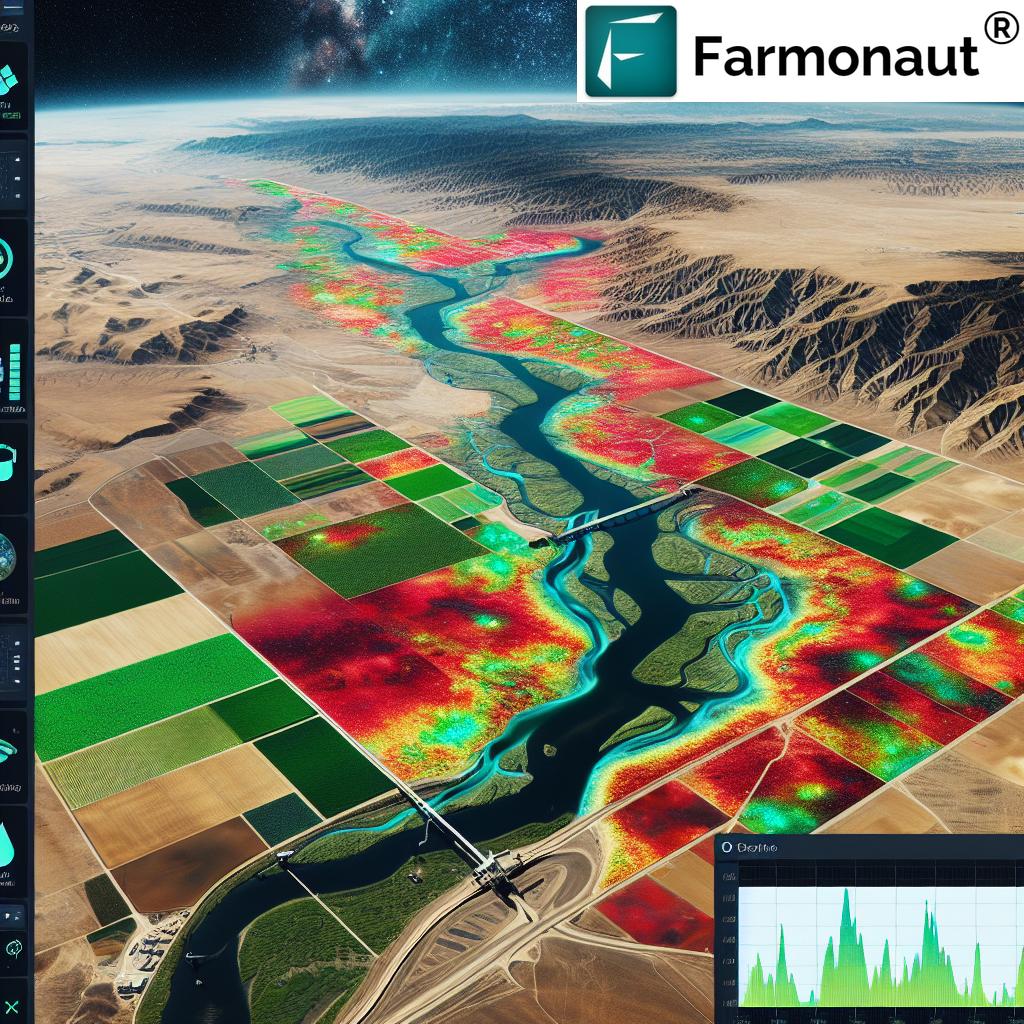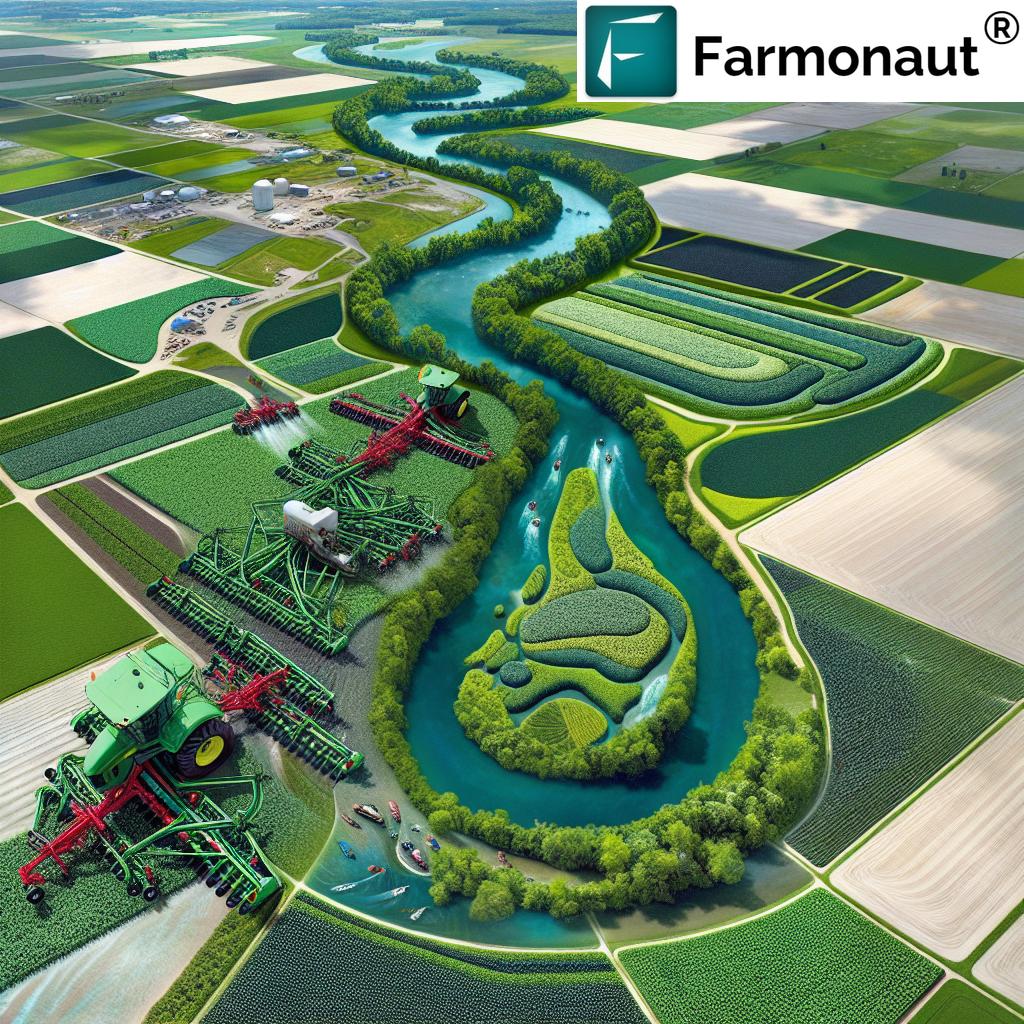Sustainable Agriculture in Wisconsin: Innovative Practices for Potato Growers in 2024

“Wisconsin’s 2024 potato growers are exploring biochar application, which can increase soil carbon content by up to 50%, enhancing sustainability.”
As we enter 2024, the landscape of sustainable agriculture in Wisconsin is evolving rapidly, particularly for potato growers. In this comprehensive guide, we’ll explore innovative farming methods, sustainable practices, and cutting-edge technologies that are shaping the future of potato cultivation in the Badger State. From irrigation management to weed control strategies, we’ll delve into the practices that are not only environmentally friendly but also economically viable for growers.
The Changing Face of Wisconsin’s Potato Industry
Wisconsin has long been renowned for its potato production, consistently ranking as one of the top potato-producing states in the US. As we move into 2024, the industry faces new challenges and opportunities, particularly in the realm of sustainable agriculture. Climate change, water scarcity, and evolving consumer preferences are driving growers to adopt more sustainable and innovative practices.
Key Sustainable Agriculture Practices for Potato Growers
- Precision irrigation management
- Integrated pest management (IPM)
- Cover cropping and crop rotation
- Soil health improvement techniques
- Advanced technology adoption
Let’s explore each of these practices in detail and see how they’re being implemented across Wisconsin’s potato farms.
Irrigation Management for Crops: Precision is Key
Effective irrigation management is crucial for potato growers, especially as water becomes an increasingly precious resource. In 2024, Wisconsin farmers are embracing precision irrigation techniques to optimize water usage while maintaining crop health and yield.
Advanced Irrigation Technologies
- Soil moisture sensors
- Weather-based irrigation scheduling
- Drip irrigation systems
- Variable rate irrigation
These technologies allow growers to apply water precisely where and when it’s needed, reducing waste and improving crop health. For instance, soil moisture sensors provide real-time data on soil water content, enabling farmers to make informed decisions about irrigation timing and quantity.
Farmonaut’s satellite-based crop health monitoring system complements these irrigation management strategies by providing valuable insights into vegetation health and soil moisture levels. By leveraging this technology, potato growers can further optimize their irrigation practices.
Weather Impact on Farming: Adapting to Climate Change
The weather’s impact on farming cannot be overstated, especially in the face of climate change. Wisconsin potato growers are increasingly relying on advanced weather forecasting and climate adaptation strategies to mitigate risks and optimize their operations.
Climate Adaptation Strategies
- Diversifying potato varieties
- Adjusting planting and harvesting dates
- Implementing protective measures against extreme weather events
- Utilizing climate-smart agriculture practices
By adopting these strategies, growers can better prepare for and respond to weather-related challenges, ensuring more consistent yields and quality.
Weed Management Techniques: Integrating Sustainable Approaches
Effective weed management is crucial for potato growers, and sustainable approaches are becoming increasingly important. In 2024, Wisconsin farmers are adopting integrated weed management techniques that reduce reliance on chemical herbicides while maintaining crop yields.
Sustainable Weed Management Practices
- Mechanical cultivation
- Cover cropping
- Crop rotation
- Precision herbicide application
- Biological control methods
These practices not only help control weeds but also contribute to overall soil health and biodiversity on the farm. For example, cover cropping can suppress weed growth while improving soil structure and fertility.
Farmonaut’s AI-driven advisory system, Jeevn AI, can provide valuable insights for weed management, helping farmers make informed decisions about when and how to implement various control strategies.
Innovative Farming Methods: Biochar and Beyond
Wisconsin potato growers are at the forefront of adopting innovative farming methods to enhance sustainability and productivity. One such method gaining traction is the application of biochar.
Benefits of Biochar Application
- Improves soil water retention
- Enhances nutrient availability
- Increases soil carbon sequestration
- Reduces soil acidity
- Promotes beneficial microbial activity
Biochar, a form of charcoal produced from plant matter, is being used by potato growers to improve soil health and increase crop yields. Its porous structure helps retain water and nutrients, making it an excellent soil amendment for potato cultivation.
“The Agricultural Roads Improvement Program in Wisconsin aims to upgrade 20% of farm access roads by 2024, boosting infrastructure for potato growers.”
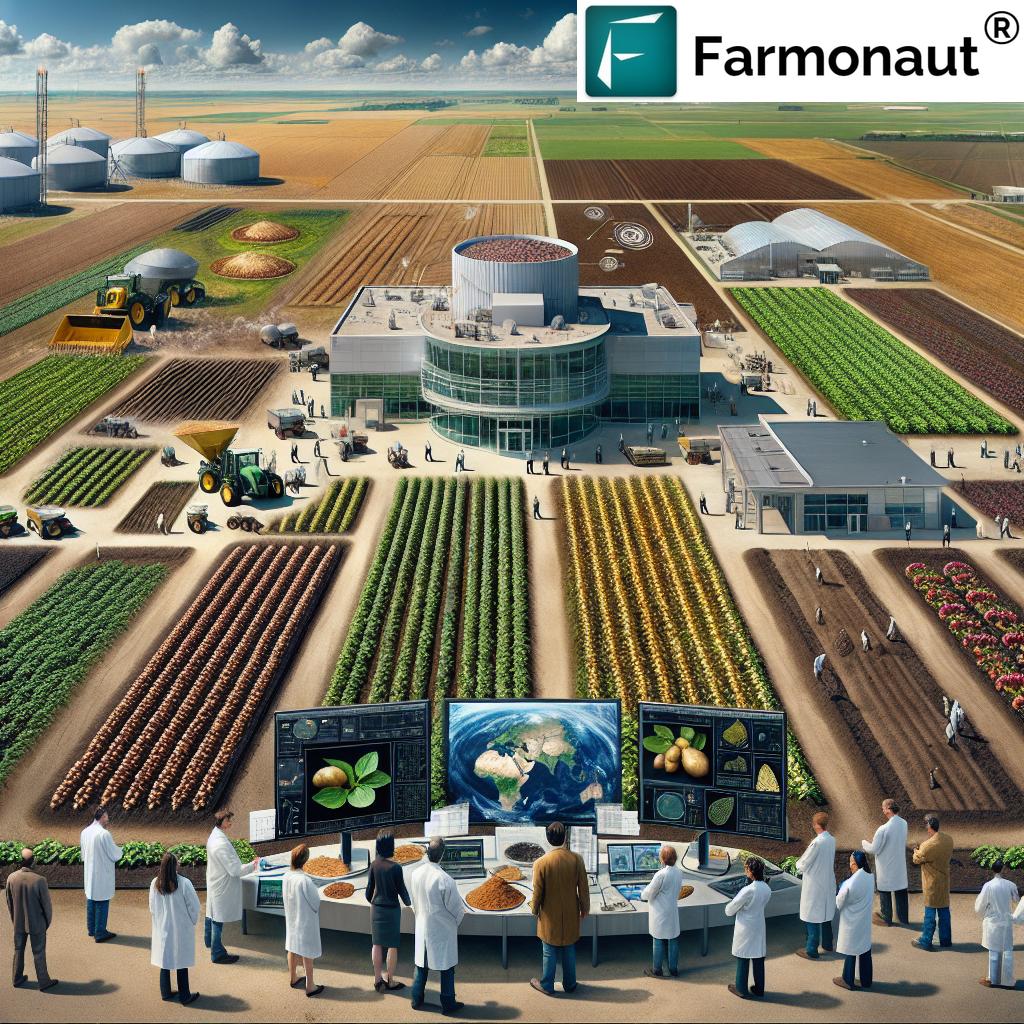
Food Safety Compliance in Agriculture: Ensuring Quality and Trust
Food safety is paramount in the potato industry, and Wisconsin growers are committed to maintaining high standards. In 2024, we’re seeing increased emphasis on traceability and compliance with food safety regulations.
Key Food Safety Practices
- Implementation of Good Agricultural Practices (GAP)
- Regular GAP testing and certification
- Enhanced traceability systems
- Strict hygiene protocols during harvesting and processing
- Comprehensive staff training on food safety
These practices not only ensure compliance with regulations but also build consumer trust and open up new market opportunities for Wisconsin potato growers.
Farmonaut’s blockchain-based traceability solution can be a valuable tool for potato growers looking to enhance their food safety practices and provide transparent information to consumers and retailers.
Agricultural Research and Education: Driving Innovation
The future of sustainable potato farming in Wisconsin is closely tied to ongoing research and education efforts. In 2024, we’re seeing increased collaboration between growers, researchers, and educational institutions to drive innovation in the industry.
Key Research Areas
- Development of drought-resistant potato varieties
- Sustainable pest management strategies
- Soil health improvement techniques
- Precision agriculture technologies
- Climate change adaptation strategies
These research initiatives are helping to solve real-world challenges faced by potato growers and are paving the way for more sustainable and productive farming practices.
Farm Infrastructure Improvement: Enhancing Efficiency
Improving farm infrastructure is crucial for enhancing the efficiency and sustainability of potato farming operations. In 2024, Wisconsin is seeing significant investments in farm infrastructure, supported by governmental programs like the Agricultural Roads Improvement Program.
Key Infrastructure Improvements
- Upgrading farm access roads
- Modernizing storage facilities
- Implementing renewable energy systems
- Enhancing water management infrastructure
- Adopting smart farming technologies
These improvements not only enhance operational efficiency but also contribute to the overall sustainability of potato farming in Wisconsin.
Farmonaut’s fleet and resource management tools can help potato growers optimize their logistics and machinery usage, further enhancing the efficiency of their operations.
Explore Farmonaut’s API for advanced agricultural data integration
Agricultural Workforce Solutions: Addressing Labor Challenges
The agricultural sector, including potato farming, faces ongoing labor challenges. In 2024, Wisconsin growers are exploring innovative workforce solutions to ensure they have the skilled labor needed for their operations.
Workforce Solutions
- Automation and robotics in farming operations
- Training programs for local workers
- Partnerships with educational institutions
- Improving working conditions and benefits
- Exploring legal pathways for seasonal workers
These solutions aim to address the labor shortage while also improving the skills and working conditions of agricultural workers.
Agricultural Labor Law Compliance: Ensuring Fair and Legal Practices
Compliance with agricultural labor laws is crucial for Wisconsin potato growers. In 2024, there’s an increased focus on ensuring fair labor practices and legal compliance in all aspects of farm operations.
Key Compliance Areas
- Fair wage practices
- Workplace safety regulations
- Working hours and overtime rules
- Child labor laws
- Workers’ rights and protections
Staying compliant with these laws not only protects workers but also safeguards growers from legal issues and helps maintain a positive reputation in the industry.
Upcoming Agricultural Events in Wisconsin
Staying connected with the agricultural community is vital for potato growers. Here are some key events coming up in Wisconsin that focus on sustainable agriculture and innovative farming practices:
- Legal Symposium on Workforce Solutions (October 2024): Addressing labor law compliance and workforce challenges in agriculture.
- Sustainable Farming Workshop (September 2024): Focusing on innovative farming methods and sustainable practices for potato growers.
- Agricultural Technology Expo (November 2024): Showcasing the latest in farming technology, including precision agriculture tools.
- Potato Growers’ Annual Conference (January 2025): A comprehensive event covering all aspects of potato farming, from growing techniques to market trends.
These events offer valuable opportunities for networking, learning, and staying up-to-date with the latest developments in the industry.
For growers looking to leverage technology in their operations, Farmonaut offers comprehensive resources and support. Check out our API Developer Docs for more information on integrating advanced agricultural data into your systems.
Sustainable Practices for Wisconsin Potato Growers in 2024
| Practice | Benefits | Implementation Challenges | Estimated Cost Savings |
|---|---|---|---|
| Precision Irrigation Management | Water conservation, improved crop health | Initial technology investment | $100-$200 per acre annually |
| Biochar Application | Soil health improvement, carbon sequestration | Sourcing quality biochar, application methods | $50-$150 per acre annually |
| Integrated Weed Management | Reduced herbicide use, improved biodiversity | Labor intensive, requires careful planning | $75-$125 per acre annually |
| Remote Sensing Technology | Early problem detection, precision farming | Data interpretation, technology adoption | $150-$250 per acre annually |
Conclusion: Embracing a Sustainable Future
As we’ve explored throughout this blog, the landscape of potato farming in Wisconsin is evolving rapidly, with sustainability at its core. From innovative irrigation management to cutting-edge technologies like those offered by Farmonaut, growers have a wealth of tools and practices at their disposal to enhance productivity while minimizing environmental impact.
The future of potato farming in Wisconsin looks bright, with growers embracing sustainable practices, leveraging advanced technologies, and adapting to changing climatic conditions. By continuing to innovate and collaborate, Wisconsin’s potato industry is well-positioned to meet the challenges of the future while maintaining its position as a leader in sustainable agriculture.
FAQs
- Q: How can potato growers in Wisconsin improve their irrigation efficiency?
A: Growers can improve irrigation efficiency by adopting precision irrigation technologies like soil moisture sensors, weather-based scheduling, and variable rate irrigation systems. These tools help apply water precisely where and when it’s needed, reducing waste and improving crop health. - Q: What are the benefits of using biochar in potato farming?
A: Biochar improves soil water retention, enhances nutrient availability, increases soil carbon sequestration, reduces soil acidity, and promotes beneficial microbial activity. These benefits can lead to improved crop yields and soil health. - Q: How can potato growers adapt to climate change in Wisconsin?
A: Growers can adapt by diversifying potato varieties, adjusting planting and harvesting dates, implementing protective measures against extreme weather events, and utilizing climate-smart agriculture practices. - Q: What sustainable weed management techniques are effective for potato farming?
A: Effective sustainable weed management techniques include mechanical cultivation, cover cropping, crop rotation, precision herbicide application, and biological control methods. - Q: How can technology like Farmonaut’s solutions benefit potato growers?
A: Farmonaut’s solutions, such as satellite-based crop health monitoring and AI-driven advisory systems, can help growers make informed decisions about irrigation, pest management, and resource allocation, leading to improved efficiency and productivity.






